What Are the Benefits and Applications of Retail Chatbots
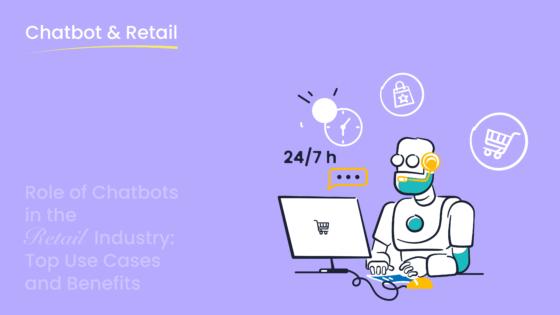
Retail chatbots are transforming how you engage with customers by offering instant responses and seamless support. Their 24/7 support ensures that customers receive assistance at any time, which 64% of users consider the most valuable feature. These chatbots also enhance customer service by addressing up to 80% of routine inquiries, reducing wait times and improving satisfaction. For businesses, this means fewer operational costs and better efficiency.
With tools like Sobot's AI chatbot, you can personalize the customer experience, guiding buyers through their journey while boosting sales. As chatbots for retail continue to evolve, they play a crucial role in creating meaningful, real-time interactions that keep customers coming back.
Key Benefits of Retail Chatbots
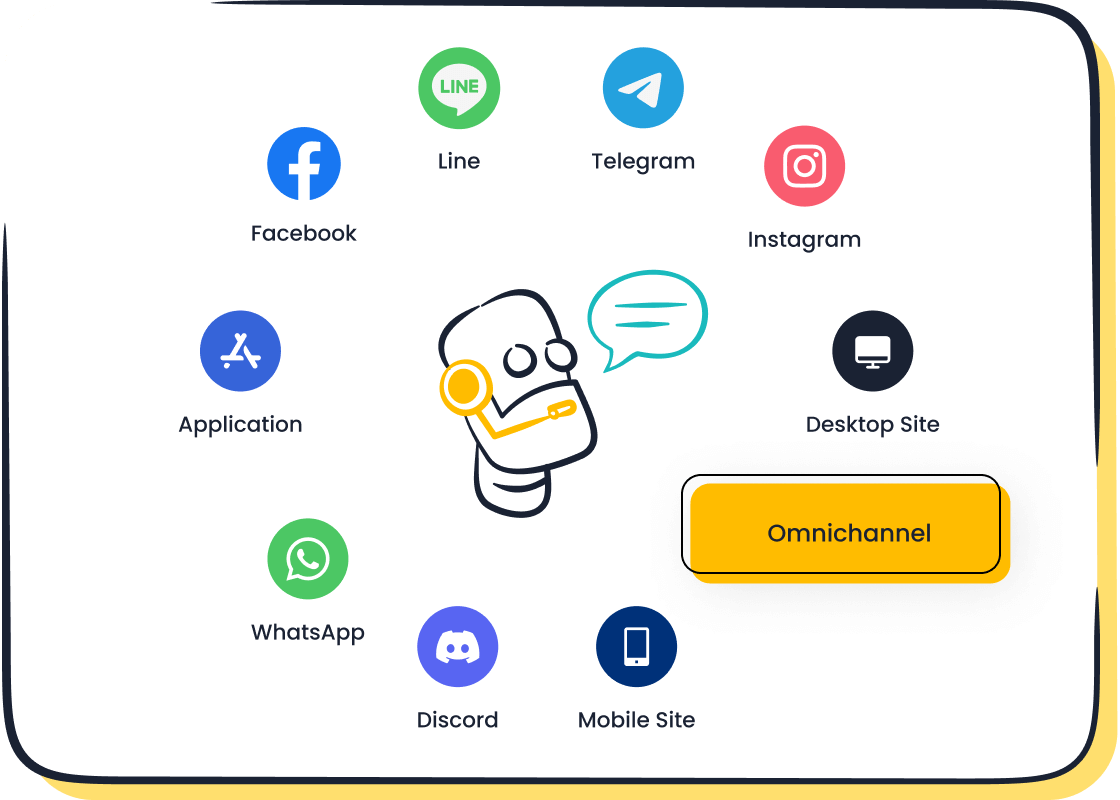
24/7 Availability for Customer Support
Retail chatbots provide round-the-clock assistance, ensuring your customers never have to wait for help. This 24/7 support allows you to address inquiries instantly, whether it's midnight or midday. Chatbots can answer FAQs, recommend products, and even offer promotions based on customer intent. This availability significantly boosts customer satisfaction and loyalty.
For example, businesses using chatbots have seen a 40% increase in bookings outside business hours. Additionally, average response times have dropped from 24 hours to just 30 seconds, creating a seamless experience for your customers. By offering immediate assistance, retail chatbots enhance operational efficiency and keep your customers engaged.
Sobot’s AI chatbot excels in this area, providing multilingual, omnichannel support across platforms like WhatsApp and SMS. Its ability to operate 24/7 ensures your customers always receive timely responses, improving satisfaction and retention rates.
Cost Reduction and Operational Efficiency
Retail chatbots are game-changers when it comes to cutting costs and streamlining operations. By automating routine inquiries, they reduce the need for human agents, saving you money on labor and infrastructure. Businesses integrating chatbots have reported remarkable savings:
- A global software company achieved a 40% cost reduction within six months.
- Vodafone reduced its cost-per-chat by 70% after implementing AI chatbots.
- Klarna’s AI assistant manages two-thirds of customer chats, equivalent to 700 full-time agents, contributing to an estimated $40 million profit improvement.
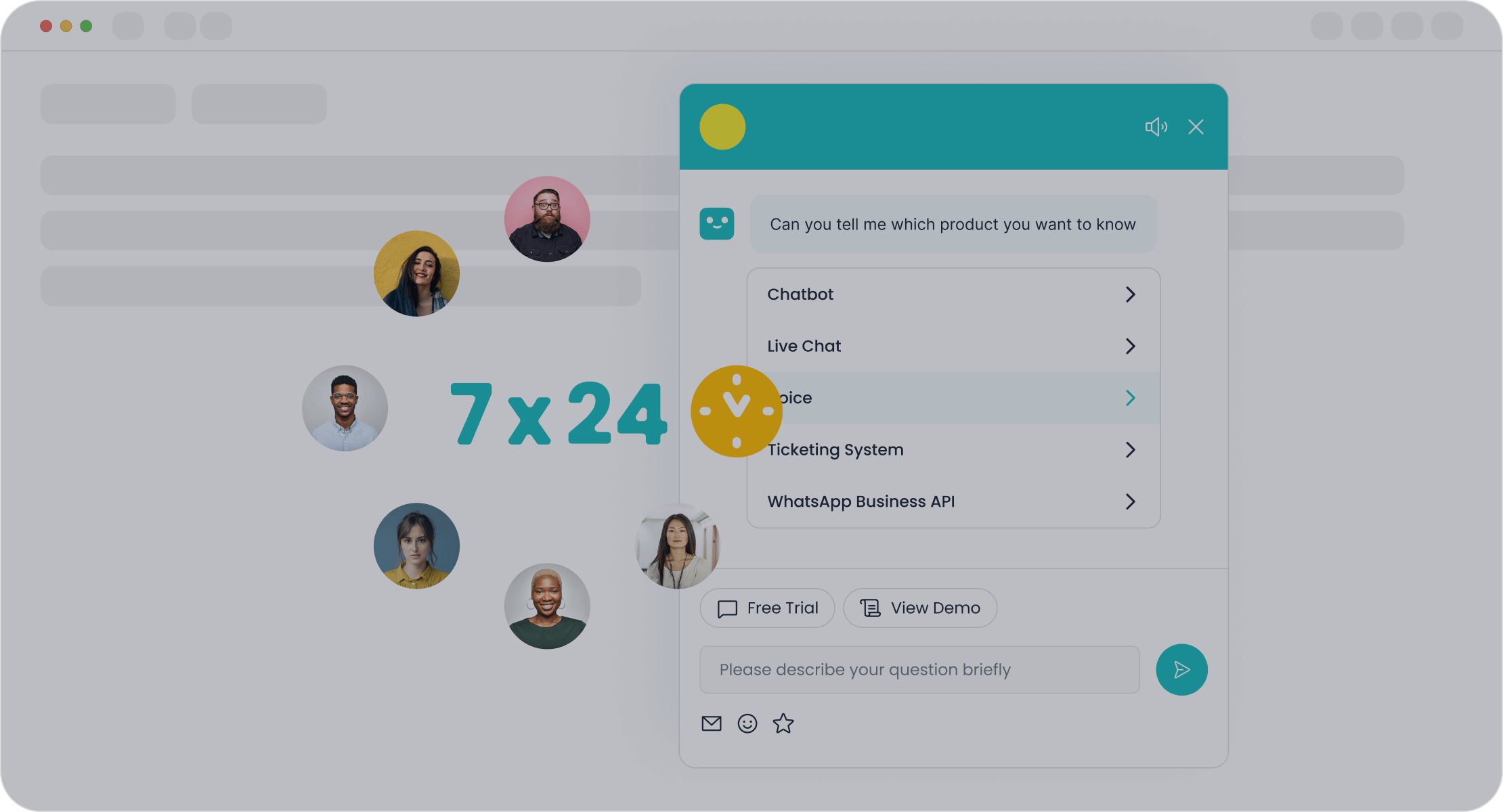
Chatbots also handle up to 80% of routine inquiries, freeing your team to focus on complex issues. Sobot’s AI chatbot takes this efficiency to the next level by autonomously solving regular queries and assisting agents, improving productivity by 70%. Its proactive messaging and real-time intent assistance further optimize operations, helping you save up to 50% on additional agent costs.
Personalized Shopping Assistance
Personalized shopping assistance is one of the most impactful benefits of retail chatbots. By analyzing customer preferences and behaviors, chatbots can recommend products tailored to individual needs. This personalization drives engagement, boosts conversion rates, and fosters brand loyalty.
Retailers using personalized experiences often report higher customer satisfaction and increased sales. In fact, 99% of B2B marketers have experienced improved conversion rates through chatbot-driven personalization. Chatbots can guide your customers through their shopping journey, offering suggestions and answering questions in real time.

Sobot’s AI chatbot specializes in delivering personalized service. Its smart self-service features and proactive push messaging help you convert browsers into buyers, increasing conversions by 20%. With its customizable design, you can create unique shopping experiences that resonate with your audience, enhancing retail experiences and driving growth.
Enhanced Customer Engagement and Retention
Retail chatbots play a pivotal role in enhancing customer engagement and retention. By offering personalized interactions, they create meaningful connections that keep customers coming back. Chatbots can proactively address customer needs, recommend products, and even provide tailored promotions based on shopping behavior. These features not only improve satisfaction but also foster loyalty.
For instance, 54% of consumers engaged in daily AI-enabled interactions with retail organizations in 2020. This demonstrates how chatbots have become integral to modern retail experiences. Their ability to provide 24/7 support ensures customers always receive assistance, whether they need help with product selection or resolving issues.
Here’s how chatbots contribute to retention:
- Personalized interactions: Tailored recommendations based on preferences.
- Proactive engagement: Addressing needs before customers even ask.
- Convenience: Instant responses and seamless support across channels.
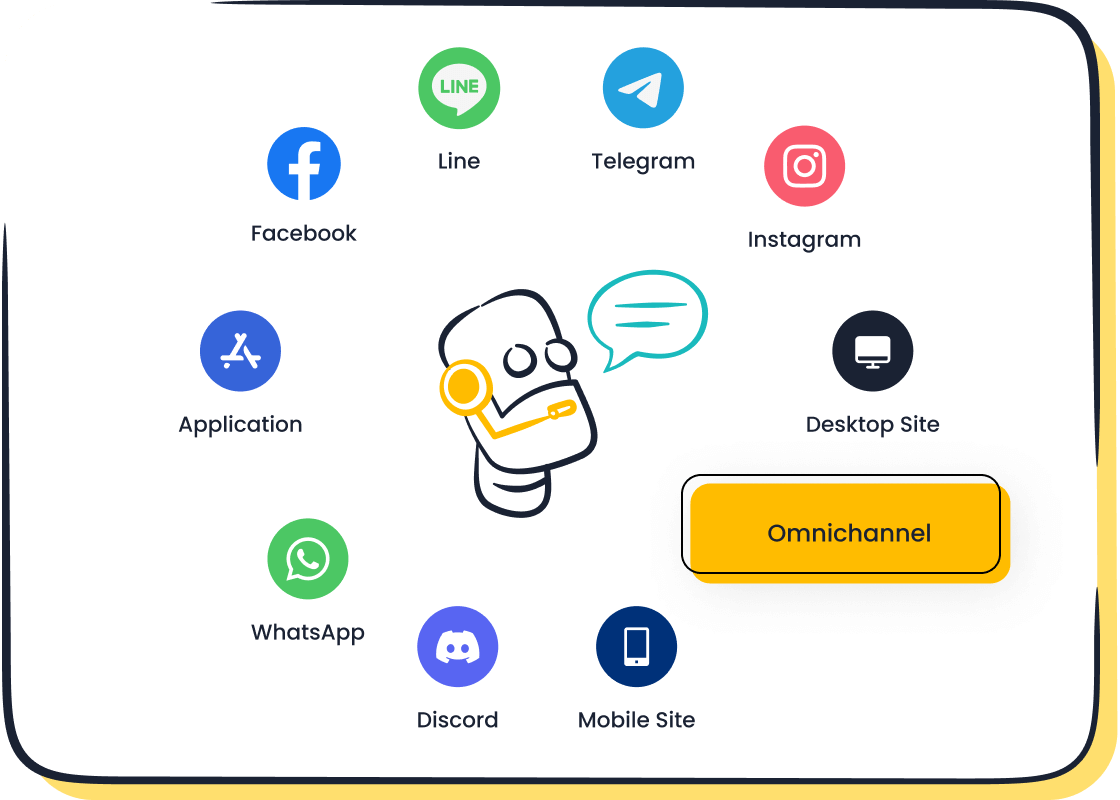
Sobot’s AI chatbot excels in enhancing retail experiences. Its omnichannel support ensures customers can interact through their preferred platforms, such as WhatsApp or SMS. By leveraging AI-driven analytics, Sobot helps businesses understand customer behavior and preferences, enabling proactive engagement that drives loyalty.
Data-Driven Insights for Business Growth
Retail chatbots generate valuable data that can transform your business strategies. By analyzing customer interactions, they provide insights into shopping patterns, preferences, and pain points. These insights empower you to make informed decisions, optimize operations, and boost sales.
Consider the measurable impact of data-driven insights:
| Company | Sales Increase | Other Metrics |
|-------------|----------------|-----------------------------------|
| Company A | 30% | 25% decrease in cart abandonment |
| Customer X | 40% | 35% increase in conversion |
| Customer Z | 25% | N/A |
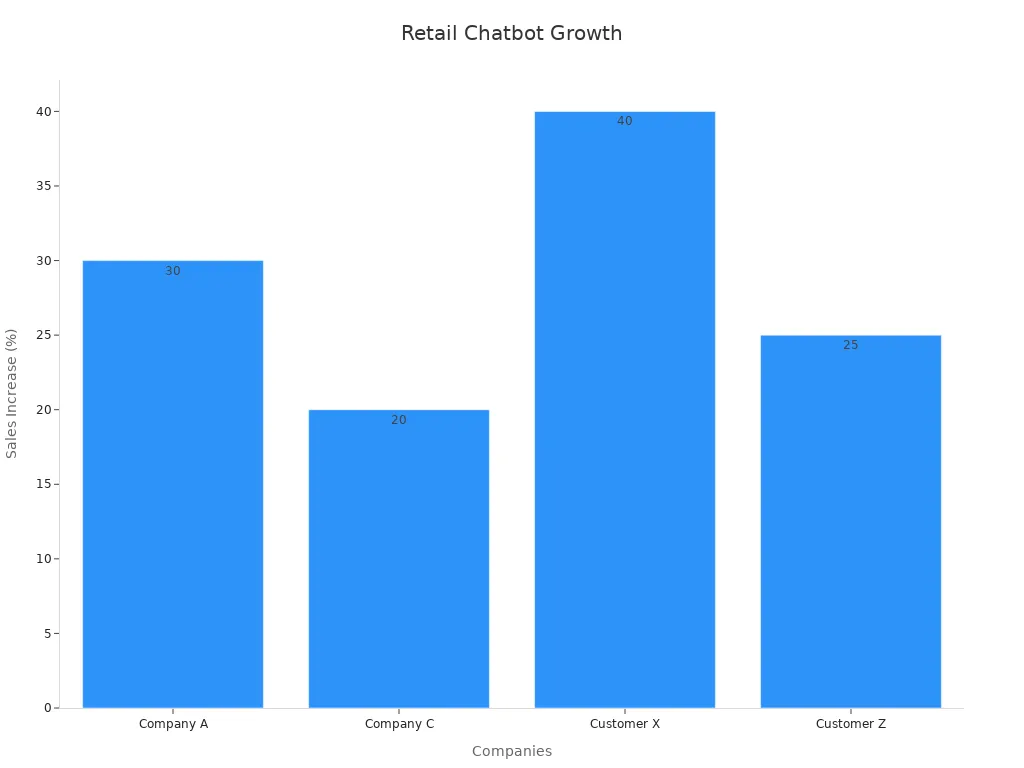
Chatbots also help resolve issues like cart abandonment by offering timely reminders and incentives. Automated assistants guide customers through product selection and upselling, contributing to projected chatbot transactions of $112 billion in eCommerce by 2025.
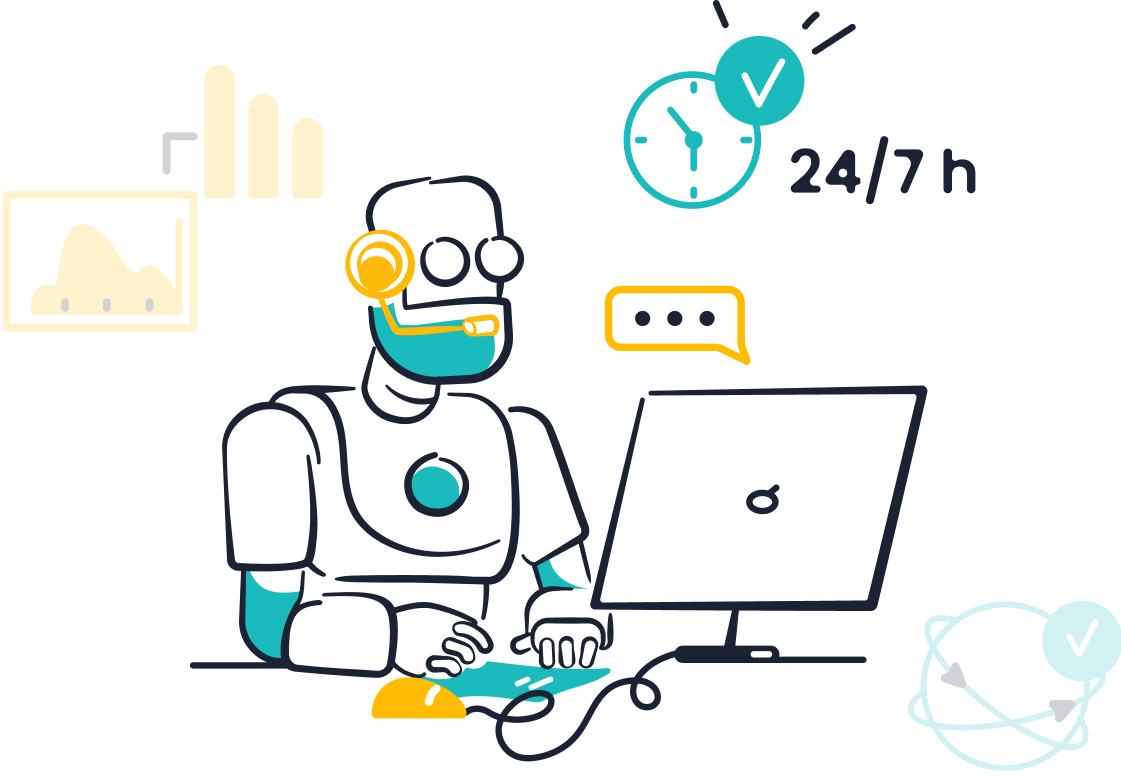
Sobot’s AI chatbot takes data-driven insights to the next level. Its reporting and optimization capabilities allow businesses to identify gaps in their knowledge base and refine their strategies. By leveraging these insights, you can improve conversion rates, reduce cart abandonment, and achieve sustainable growth.
Practical Applications of Chatbots for Retail
Product Recommendations and Discovery
Chatbots excel at helping customers find the right products quickly and effortlessly. By analyzing browsing behavior and preferences, they deliver personalized recommendations that match individual needs. This feature not only enhances the shopping experience but also drives sales. For instance, businesses using chatbots for retail have reported a 15-20% increase in average order values when personalized recommendations are provided.
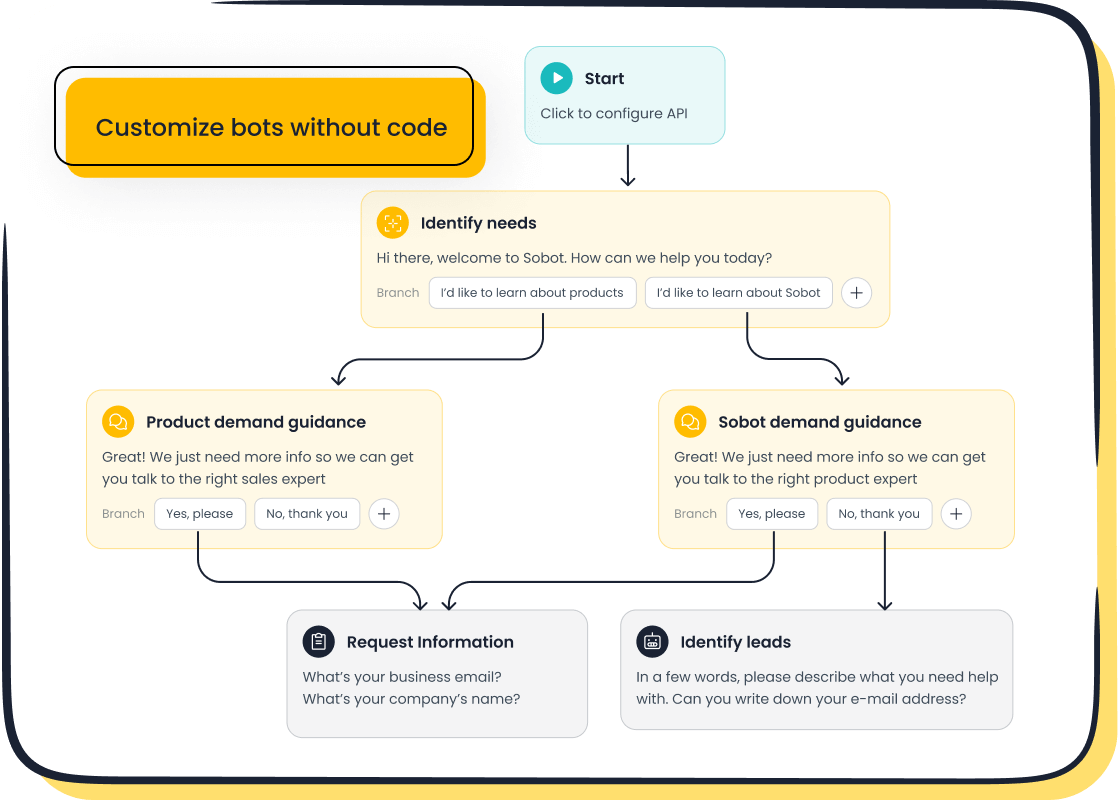
Imagine a customer browsing your online store for a gift. A chatbot can suggest trending items, highlight discounts, or even bundle complementary products. This proactive assistance simplifies decision-making and encourages purchases. Sobot’s AI chatbot takes this a step further by offering multilingual support and omnichannel integration, ensuring customers receive tailored suggestions across platforms like WhatsApp and SMS.
Tip: Personalized recommendations can significantly boost conversions. Studies show that e-commerce interactions with chatbots improve conversion rates by 20-40%, making them a valuable tool for product discovery.
Order Tracking and Delivery Updates
Keeping customers informed about their orders is crucial for building trust and satisfaction. Chatbots streamline this process by providing real-time tracking and delivery updates. Customers can simply ask, “Where’s my package?” and receive instant answers without waiting for human agents.
Businesses leveraging chatbots for order tracking have seen remarkable results:
- 67% increase in sales-qualified leads.
- 90% reduction in customer service wait times.
- 50% longer interaction times, thanks to 24/7 availability.
Sobot’s AI chatbot enhances this experience by integrating with logistics systems to deliver accurate updates. Whether customers place orders online or need in-store assistance, the chatbot ensures they stay informed every step of the way. This seamless communication fosters trust and encourages repeat purchases.
Research highlights that chatbots excel at managing high-volume inquiries like order status checks. Their ability to handle hundreds of queries simultaneously reduces wait times and improves customer satisfaction.
Customer Support and Issue Resolution
Chatbots are transforming customer support by resolving issues faster and more efficiently. They handle routine inquiries like FAQs, refunds, and account updates, freeing human agents to focus on complex problems. This efficiency leads to higher satisfaction and better resource allocation.
Here’s how chatbots improve customer support:
- They manage multiple queries at once, reducing wait times.
- They provide accurate responses, ensuring customers get the help they need.
- They operate 24/7, resolving issues promptly without delays.
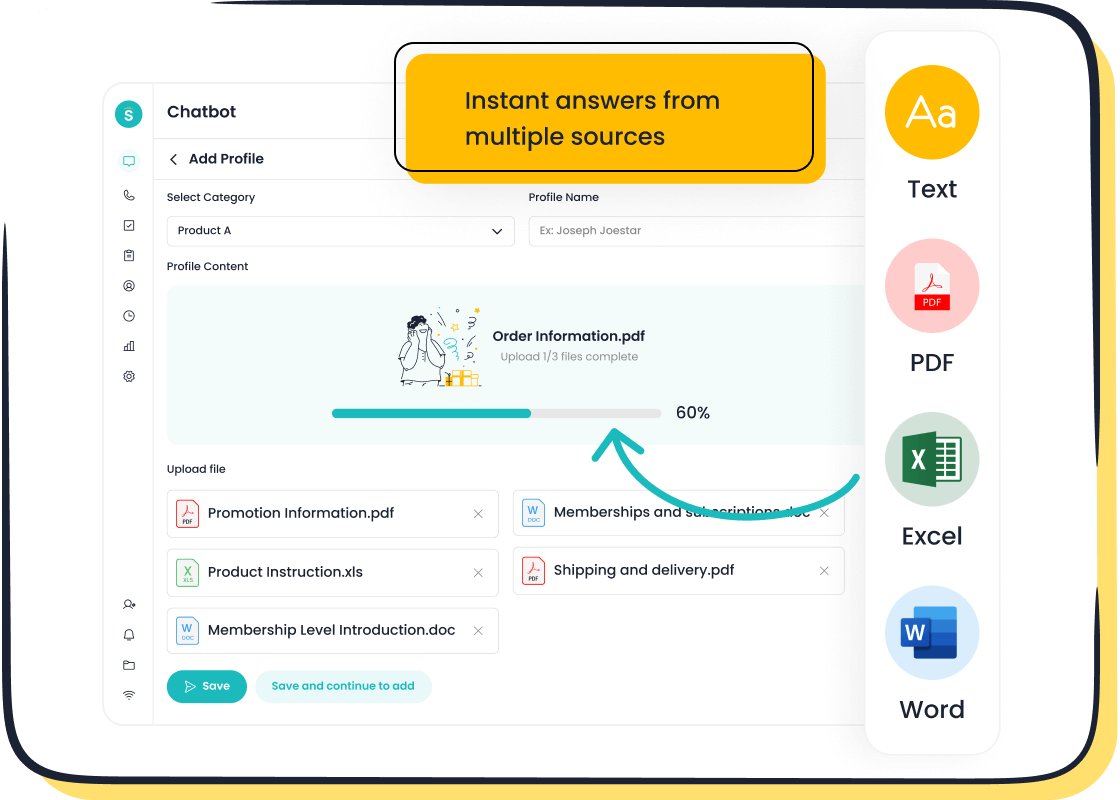
Sobot’s AI chatbot stands out with its ability to autonomously solve regular queries and assist agents in real time. Its proactive messaging and smart self-service features ensure customers receive timely support, whether they’re shopping online or seeking in-store assistance. By integrating AI-driven analytics, Sobot helps businesses optimize their support strategies and improve resolution rates.
Note: A single chatbot can handle hundreds of inquiries simultaneously, making it an indispensable tool for modern customer support.
Feedback Collection and Surveys
Chatbots are revolutionizing how you gather feedback and conduct surveys. They simplify the process by engaging customers directly during or after their shopping journey. Instead of relying on lengthy email surveys, chatbots can ask quick, targeted questions that feel conversational. This approach increases response rates and provides you with actionable insights.
For example, chatbots can measure customer satisfaction (CSAT) by asking, “How would you rate your experience today?” or track Net Promoter Scores (NPS) by inquiring, “How likely are you to recommend us?” These metrics help you understand what’s working and where improvements are needed.
Here’s a breakdown of key metrics chatbots can track:
| Metric | Description |
|---|---|
| Customer Satisfaction (CSAT) | Measures how happy users are with chatbot interactions. |
| Net Promoter Score (NPS) | Tracks how likely users are to recommend your chatbot. |
| Customer Effort Score (CES) | Evaluates how easy it is for users to resolve issues. |
| Total Conversations | Shows how often users interact with your chatbot. |
| Chat Duration | Measures how long conversations last - short but effective is ideal. |
| Chat Exit Rate | Tracks how often users leave chats before resolving their issues. |
| Response Time | Measures how quickly the chatbot replies. |
| Resolution Time | Tracks the time taken to fully resolve issues. |
| Self-Service Rate | Shows the percentage of issues resolved without human help. |
| Sales Success Rate | Measures how well the chatbot converts chats into sales. |
| Sales Amount | Tracks revenue generated through chatbot interactions. |
| Cost Per Chat | Calculates the cost of each chatbot interaction. |
Sobot’s AI chatbot excels in collecting feedback seamlessly. Its multilingual capabilities allow you to engage customers globally, while its omnichannel support ensures you can gather insights across platforms like WhatsApp and SMS. By analyzing this data, you can refine your strategies, improve customer satisfaction, and drive growth.
Tip: Use scale questions and usability metrics to evaluate your chatbot’s effectiveness. Metrics like task completion rate and time-to-completion provide deeper insights into user experience.
Upselling and Cross-Selling Opportunities
Chatbots in retail are powerful tools for increasing sales through upselling and cross-selling. They analyze customer data, such as browsing history and past purchases, to recommend complementary or higher-value products. This personalized approach not only boosts revenue but also enhances the shopping experience.
For instance, a chatbot might suggest a matching phone case when a customer buys a smartphone or recommend a premium version of a product they’re considering. These tailored suggestions feel helpful rather than intrusive, encouraging customers to make additional purchases.
Here’s how chatbots can drive upselling and cross-selling:
- Deliver personalized promotional offers based on customer profiles.
- Recommend bundle deals that combine multiple products at a discounted price.
- Follow up post-purchase with suggestions for complementary items.
- Engage in contextual conversations to understand customer needs better.
- Use order history to suggest related products.
Sobot’s AI chatbot takes upselling and cross-selling to the next level. Its smart self-service features and proactive messaging enable you to deliver targeted promotions and recommendations. By leveraging AI-driven insights, Sobot helps you identify the most effective strategies for increasing conversions. Businesses using chatbots for retail often report a 15-20% increase in average order values, showcasing the potential of these tools.
Note: Tracking metrics like conversion rates and sales success rates is essential to measure the effectiveness of your chatbot in driving additional sales.
How Sobot Chatbot Enhances Customer Service
Instant Responses to Common Queries
Sobot's chatbot transforms customer service by delivering instant responses to common queries. Customers no longer need to wait for human agents to answer routine questions like store hours, return policies, or product availability. This efficiency not only saves time but also improves customer satisfaction.
For example, Sobot's AI-powered chatbot uses a robust knowledge base to provide accurate answers in real time. It can handle hundreds of inquiries simultaneously, ensuring no customer feels ignored. Businesses using chatbots like Sobot's have reported a significant reduction in response times, with first replies dropping from hours to mere seconds. This capability enhances the overall customer experience and builds trust in your brand.
Tip: Automating responses to FAQs allows your team to focus on more complex issues, improving productivity and operational efficiency.
Multichannel Support Integration
Sobot's chatbot excels in multichannel support integration, allowing you to connect with customers across platforms like WhatsApp, SMS, email, and social media. This seamless integration ensures a consistent experience, regardless of the channel your customers prefer.
Here’s a snapshot of how Sobot's multichannel capabilities have driven success:
| Success Story Description | Outcome |
|---|---|
| Reduced inbound discussion volume by 20% and increased positive feedback to 96%+ | 20% reduction in inquiries, 96% positive feedback |
| Streamlined experiences across various channels to meet 'Beyond Banking' goals | Improved operational efficiency |
| Over 80% correct answers and 95% customer satisfaction | High accuracy and satisfaction rates |
| 22.2% of customer questions answered independently, CSAT score of 97% | High self-service success and customer satisfaction |
| 85% of problems solved, 99% customer happiness | High problem resolution and customer satisfaction |
| Sign-off rate increased by 35%, COD collection rate up by 40% | Improved operational metrics in delivery communication |
This multichannel approach ensures your chatbot meets customers wherever they are, enhancing engagement and retention.
Reducing Wait Times and Frustration
Sobot's chatbot significantly reduces wait times and customer frustration by automating responses and streamlining issue resolution. Before automation, customers often waited up to 15 minutes for a first response. With Sobot, this time has dropped to just 2 minutes—a remarkable 86.7% improvement.
Here’s how Sobot's chatbot impacts key metrics:
| Metric | Before Automation | After Automation | Improvement |
|---|---|---|---|
| First Response Time | 15 minutes | 2 minutes | 86.7% |
| Resolution Time | 60 minutes | 30 minutes | 50% |
| CSAT Score | 75% | 85% | 13.3% |
| Resolution Rate | 60% | 80% | 33.3% |
| Escalation Rate | 20% | 5% | 75% |
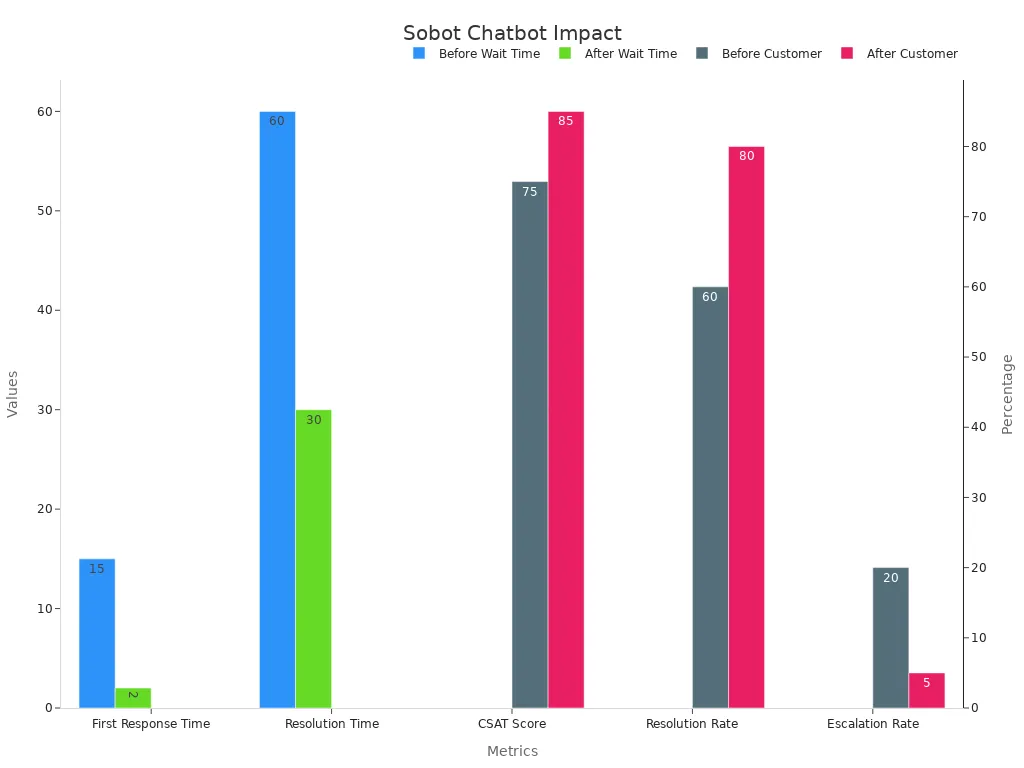
By resolving issues faster, Sobot's chatbot improves customer satisfaction and reduces the likelihood of escalations. This efficiency allows your team to focus on delivering exceptional customer service for more complex needs.
Proactive Assistance and Notifications
Proactive assistance and notifications are transforming how you interact with customers. Retail chatbots equipped with these features anticipate customer needs and provide timely updates, creating a seamless shopping experience. For instance, chatbots can notify customers about order confirmations, shipping updates, or even restocked items they’ve shown interest in. These proactive measures reduce uncertainty and build trust.
Businesses that use proactive notifications often see higher customer satisfaction. For example, Amazon’s chatbot provides real-time order tracking updates, allowing customers to check package status instantly. Similarly, FedEx uses its chatbot to deliver shipment updates across multiple channels, improving transparency and convenience.
| Example | Description |
|---|---|
| Amazon | Provides real-time order tracking updates through its chatbot, enhancing customer experience by allowing immediate access to package status without human agent interaction. |
| FedEx | Offers real-time tracking information via its chatbot, improving transparency and customer satisfaction by enabling customers to receive updates on their shipments through various channels. |
Sobot’s AI chatbot excels in proactive assistance. It sends personalized notifications, such as reminders for abandoned carts or exclusive promotions, directly to customers. These messages encourage engagement and drive sales. The chatbot also integrates with logistics systems to provide accurate delivery updates, ensuring customers stay informed at every step.
Proactive assistance doesn’t just improve satisfaction; it also boosts efficiency. By automating updates, retail chatbots reduce the need for human agents to handle repetitive inquiries. This allows your team to focus on more complex tasks. With Sobot’s omnichannel support, you can deliver these notifications across platforms like WhatsApp, SMS, and email, ensuring consistent communication.
Incorporating proactive assistance into your retail strategy enhances the customer journey. It keeps customers informed, reduces frustration, and fosters loyalty. Retail chatbots like Sobot’s make this process effortless, helping you stay ahead in a competitive market.
Retail Chatbots in Ecommerce

Guiding Customers Through the Purchase Journey
Retail chatbots simplify the purchase journey by offering real-time assistance at every stage. They guide customers through product discovery, answer questions, and provide step-by-step instructions during checkout. This support reduces confusion and ensures a smooth shopping experience. For example, chatbots can suggest products based on browsing history or clarify payment options, helping customers make informed decisions.
The impact of chatbots on the purchase journey is significant:
| Evidence Type | Description |
|---|---|
| Cart Abandonment Reduction | Chatbots remind customers about abandoned carts, encouraging them to return. |
| Personalized Discounts | They offer tailored discounts to hesitant buyers, boosting conversion rates. |
| Simplified Checkout Process | Chatbots streamline checkout with clear, actionable steps. |
| Real-time Support | They provide instant answers, enhancing trust and satisfaction. |
Sobot’s AI chatbot excels in guiding customers. Its multilingual capabilities and omnichannel support ensure seamless interactions across platforms like WhatsApp and SMS. By offering personalized recommendations and proactive assistance, Sobot helps you convert browsers into buyers.
Handling Abandoned Carts
Abandoned carts are a common challenge in ecommerce. Chatbots address this issue by sending timely reminders and offering incentives to encourage customers to complete their purchases. For instance, a chatbot might notify a customer about a forgotten item in their cart and provide a discount code to finalize the sale.
Here’s how chatbots improve cart recovery:
| Metric | Description |
|---|---|
| Abandonment Rate | Tracks the percentage of users who leave items in their cart without checking out. |
| Recovery Rate | Measures how many customers return and complete their purchase after chatbot intervention. |
| Conversion Rate | Indicates the percentage of customers who finalize their purchase after receiving recovery messages. |
| Engagement Rate | Reflects how often customers interact with recovery messages, such as opening emails or clicking links. |
Sobot’s AI chatbot uses proactive messaging to tackle cart abandonment. It sends personalized reminders and offers, increasing recovery rates and driving sales. Businesses using chatbots for cart recovery often report a 20-30% improvement in conversion rates.
Providing Post-Purchase Support
Post-purchase support is essential for building customer loyalty. Chatbots enhance this experience by offering 24/7 assistance for order tracking, returns, and exchanges. They also provide personalized solutions by accessing historical data, ensuring customers feel valued.
Key benefits of post-purchase support include:
- Always-On Assistance: Chatbots handle queries about order statuses and product details anytime.
- Returns and Exchanges: They guide customers through the return process, making it simple and efficient.
- Customer Satisfaction: Generative AI chatbots deliver tailored solutions, improving user experience.
Sobot’s AI chatbot stands out in post-purchase support. Its integration with logistics systems ensures accurate delivery updates, while its multilingual capabilities cater to a global audience. By streamlining returns and providing proactive notifications, Sobot helps you maintain high satisfaction rates and foster repeat business.
Enabling Seamless Mobile Shopping Experiences
Mobile shopping has become a cornerstone of modern retail. Customers expect fast, personalized, and convenient experiences when browsing or purchasing on their smartphones. Retail chatbots play a vital role in meeting these expectations by offering instant assistance, tailored recommendations, and proactive notifications.
Chatbots integrated into mobile platforms simplify the shopping process. They guide customers through product discovery, answer questions, and provide real-time updates. For example, a chatbot can suggest items based on browsing history or notify users about exclusive discounts. These features reduce friction and encourage purchases, creating a seamless experience.
Tip: Mobile-friendly chatbots improve customer satisfaction by responding quickly to inquiries and offering personalized solutions.
Here’s how chatbots enhance mobile shopping experiences:
| Metric | Description |
|---|---|
| Cart abandonment recovery rate | Chatbots re-engage customers who leave before completing a purchase, boosting sales. |
| Average order value (AOV) impact | Personalized recommendations and upsells increase the value of each transaction. |
| Customer satisfaction (CSAT) | Positive interactions with chatbots improve perceptions of the shopping experience. |
| Response time | Instant replies to inquiries ensure time-sensitive requests are handled efficiently. |
| Retention | Engaging chatbot experiences encourage customers to return for future interactions. |
| Click-through rate (CTR) | Timely promotions suggested by chatbots drive higher engagement and conversions. |
| Operational efficiency | Automating repetitive inquiries reduces costs and improves resource allocation. |
Sobot’s AI chatbot excels in mobile shopping environments. Its omnichannel support ensures customers can interact seamlessly across apps like WhatsApp and SMS. The chatbot’s multilingual capabilities cater to global audiences, while its proactive messaging drives engagement. Businesses using Sobot’s chatbot often report higher retention rates and increased average order values, showcasing its impact on mobile commerce.
By integrating chatbots into your mobile shopping strategy, you can create a frictionless experience that keeps customers engaged and satisfied. Retail chatbots not only enhance convenience but also drive growth by optimizing operations and boosting sales.
Future Trends in Retail Chatbots
AI-Powered Personalization
AI-powered personalization is transforming how chatbots interact with customers. These advanced chatbots analyze customer preferences and behaviors to deliver tailored shopping experiences. For example, they can recommend products based on browsing history or suggest items that complement previous purchases. This level of personalization not only enhances customer satisfaction but also drives sales.
According to AI consultant Paul Ferguson, chatbots have evolved beyond basic interactions. They now understand customer needs and recommend products that match those requirements. This shift toward hyper-personalization is changing how businesses engage with customers. By using AI and machine learning, chatbots analyze data in real time to provide customized responses. This trend is especially impactful in ecommerce, where personalized shopping experiences can significantly boost conversion rates.

Sobot’s AI chatbot excels in delivering hyper-personalized interactions. Its ability to analyze customer data and provide tailored recommendations makes it an essential tool for modern retail businesses.
Voice-Activated Chatbots
Voice-activated chatbots are becoming a game-changer in retail. These chatbots allow customers to interact using voice commands, making the shopping experience faster and more convenient. For instance, a customer can ask a chatbot to find a specific product or check order status without typing. This hands-free interaction is particularly useful for mobile shoppers or those multitasking.
The adoption of voice-activated chatbots is growing rapidly. Studies show that 55% of households are expected to own smart speakers by 2025, creating a massive opportunity for voice-enabled retail chatbots. These chatbots not only improve accessibility but also enhance engagement by offering a more natural way to communicate.
Sobot’s AI chatbot supports voice interactions, enabling businesses to provide seamless customer experiences. Its real-time speech recognition and multilingual capabilities ensure accurate and efficient responses, making it a valuable asset for retailers.
Integration with Augmented Reality (AR)
The integration of chatbots with augmented reality (AR) is revolutionizing the retail industry. AR-powered chatbots enhance the shopping experience by allowing customers to visualize products in real-world settings. For example, a chatbot can guide a customer through trying on virtual clothing or placing furniture in their home using AR.
This combination of chatbots and AR creates immersive experiences that drive customer engagement. Retailers using AR chatbots have reported higher conversion rates and increased customer satisfaction. By blending AI with AR, businesses can offer innovative solutions that set them apart in a competitive market.
Sobot’s AI chatbot is designed to integrate with emerging technologies like AR. Its customizable features and omnichannel support make it ideal for creating unique shopping experiences that captivate customers.
Predictive Analytics for Customer Insights
Predictive analytics is transforming how you understand and engage with your customers. By analyzing historical data and identifying patterns, it helps you anticipate customer needs and make informed decisions. Retail chatbots equipped with predictive analytics provide actionable insights that improve customer satisfaction and operational efficiency.
For example, AI-powered chatbots like Sobot’s analyze customer interactions to detect trends in complaints or inquiries. This allows you to address potential issues before they escalate. Predictive analytics also helps you identify peak times, ensuring adequate staffing to handle increased demand. This proactive approach enhances the overall customer experience.
| Aspect | Description |
|---|---|
| Chatbots | AI-powered chatbots provide 24/7 service, answering questions and solving problems for customers. |
| Personalization | AI tracks customer preferences to tailor services, enhancing customer satisfaction. |
| Reducing Human Error | AI minimizes mistakes by providing consistent and accurate responses, improving service reliability. |
| Proactive Support | Predictive analytics allows companies to identify potential issues before customers report them. |
| Handling Complaints | AI can detect trends in customer complaints, enabling proactive outreach to resolve issues. |
| Staffing | Predictive analytics helps identify peak times, ensuring adequate staffing to enhance customer experience. |
Sobot’s AI chatbot excels in leveraging predictive analytics. It uses real-time data to provide personalized recommendations, boosting conversions by 20%. Its ability to analyze customer behavior helps you optimize marketing strategies and reduce cart abandonment. For instance, the chatbot can send reminders or offer discounts to customers who leave items in their carts, increasing recovery rates.
By integrating predictive analytics into your retail strategy, you gain a deeper understanding of customer preferences and behaviors. This empowers you to deliver tailored experiences, resolve issues proactively, and improve overall satisfaction. Retail chatbots like Sobot’s make this process seamless, helping you stay ahead in a competitive market.
Tip: Use predictive analytics to identify gaps in your service and refine your strategies. This data-driven approach ensures continuous improvement and sustainable growth.
Retail chatbots have become indispensable tools for modern businesses, offering cost savings, operational efficiency, and enhanced customer service. With their ability to handle up to 80% of routine inquiries, chatbots free up human agents to focus on complex issues, improving productivity by 64%. They also accelerate response times by 3x, ensuring customers receive instant support.
Sobot’s AI chatbot stands out by delivering personalized shopping experiences, proactive notifications, and multilingual support. These features help businesses streamline operations and boost customer satisfaction. For instance, businesses using chatbots report a 67% increase in sales, with 26% of transactions initiated by these digital assistants.
By integrating retail chatbots like Sobot’s into your strategy, you can stay competitive, meet evolving customer expectations, and drive sustainable growth. Explore Sobot’s solutions to transform your customer interactions and achieve measurable success.
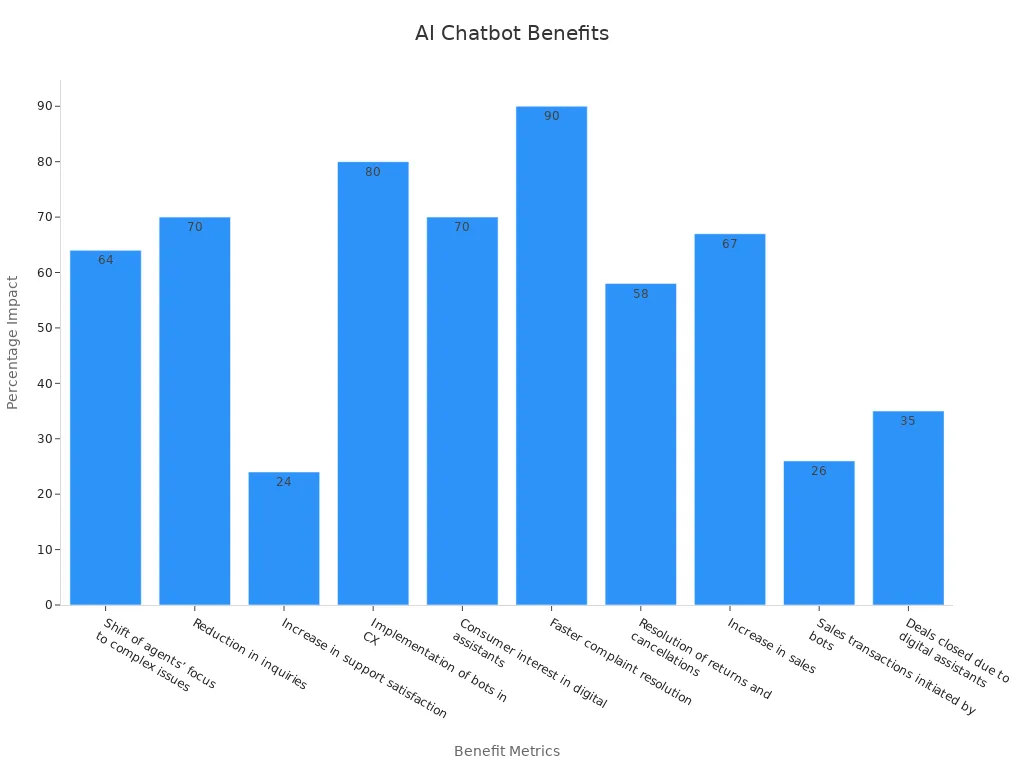
FAQ
What is a retail chatbot, and how does it work?
A retail chatbot is an AI-powered tool that automates customer interactions. It answers questions, recommends products, and provides support. Sobot’s chatbot uses a knowledge base and real-time analytics to deliver accurate responses across platforms like WhatsApp and SMS. Learn more here.
How can retail chatbots improve customer satisfaction?
Retail chatbots enhance satisfaction by offering instant responses, personalized recommendations, and 24/7 support. For example, Sobot’s chatbot reduces wait times by 86.7%, ensuring customers receive timely assistance. This efficiency builds trust and loyalty.
Are retail chatbots suitable for small businesses?
Yes, retail chatbots benefit businesses of all sizes. Sobot’s chatbot requires no coding, making it easy to deploy. It automates routine tasks, saving costs and improving efficiency. Small businesses can use it to boost conversions by 20%.
Can retail chatbots handle multiple languages?
Absolutely! Sobot’s AI chatbot supports multilingual interactions, allowing you to engage customers globally. It ensures accurate communication in their preferred language, enhancing satisfaction and retention.
How do retail chatbots help with sales growth?
Retail chatbots drive sales by upselling, cross-selling, and recovering abandoned carts. Sobot’s chatbot increases average order values by 15-20% through personalized recommendations and proactive messaging. It also boosts conversions by 20%.
See Also
Enhancing Customer Satisfaction Through E-commerce Chatbots
Selecting Live Chat Solutions for Retail Businesses
Key Advantages of Implementing Chatbots on Websites
